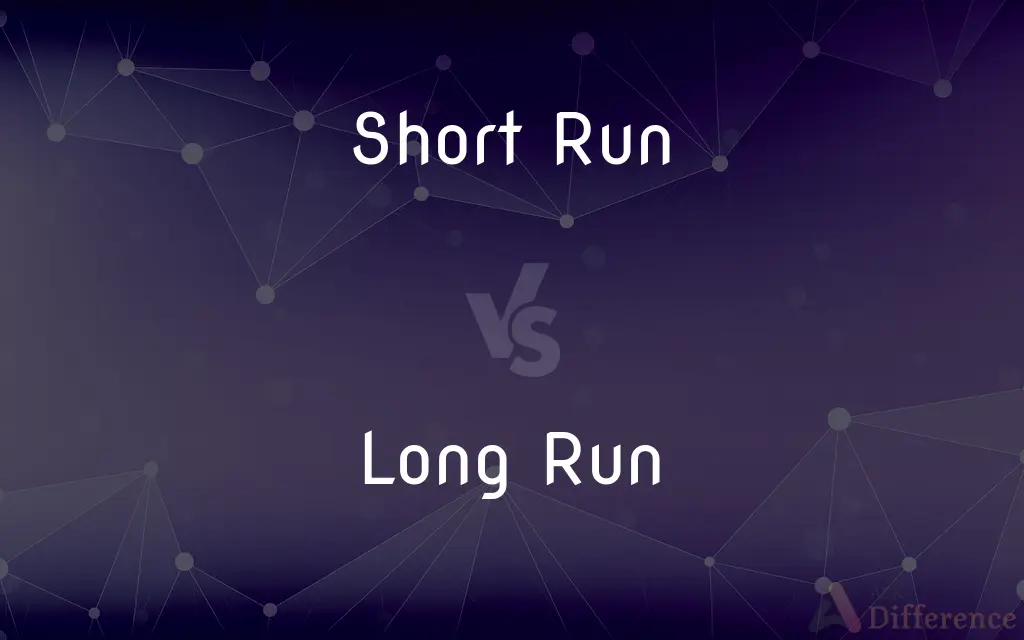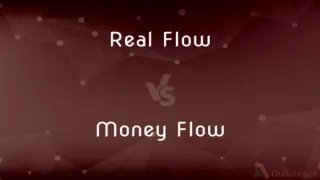Short Run vs. Long Run — What's the Difference?
By Tayyaba Rehman — Published on October 12, 2023
Short Run usually refers to a time frame in which some factors are fixed, and Long Run refers to a time frame in which all factors are variable.

Difference Between Short Run and Long Run
Table of Contents
ADVERTISEMENT
Key Differences
Short Run typically denotes a period during which at least one input of production is fixed. It is a phase where companies often focus on adjusting the variable factors to meet the immediate production needs. Long Run, conversely, is a timeframe where all inputs are variable, allowing firms to adjust all factors of production and achieve optimal scale.
In the context of economics, Short Run is a vital concept for firms to manage immediate demands and constraints, often prioritizing operational efficiency. Long Run, on the other hand, is significant for strategic planning and organizational sustainability, where all elements, including capital and labor, can be optimized.
In economic analysis, Short Run involves evaluating decisions and outcomes within limited time constraints, often highlighting the importance of quick adaptations and solutions. Long Run, in contrast, demands a comprehensive evaluation, focusing on sustainable growth and long-term feasibility of economic activities.
Short Run is crucial for addressing immediate market fluctuations and consumer demands, allowing firms to remain competitive. Long Run is essential for evaluating and implementing structural changes and innovations, ensuring the prolonged success of an organization.
Comparison Chart
Time Frame
Limited, with fixed inputs
Extended, with variable inputs
ADVERTISEMENT
Factor Adjustment
Adjusts only variable factors
Adjusts all factors of production
Flexibility
Less flexible in altering all inputs
More flexible, can alter any input
Scale
Cannot achieve optimal scale
Can achieve optimal scale
Planning
Immediate operational needs
Strategic, long-term planning
Compare with Definitions
Short Run
Short Run is a timeframe for immediate decision-making and actions.
The Short Run demand for the product was higher than anticipated.
Long Run
Long Run refers to an extended timeframe allowing for full factor adjustment.
The organization aims to increase market share in the Long Run.
Short Run
Short Run represents a period of evaluating quick, adaptable solutions.
Short Run strategies were implemented to combat sudden market changes.
Long Run
Long Run is a period where all production inputs are variable.
In the Long Run, the company plans to diversify its product range.
Short Run
Short Run refers to a temporary period with specific constraints.
In the Short Run, the company may face increased production costs.
Long Run
Long Run is synonymous with strategic, long-term planning and analysis.
A focus on sustainability is crucial for Long Run success.
Short Run
Short Run denotes an economic phase where some production factors remain fixed.
The firm increased output in the Short Run by hiring temporary staff.
Long Run
Long Run denotes a phase where optimal scale can be achieved.
Innovations implemented now will benefit the firm in the Long Run.
Short Run
Short Run is a concept used for analyzing immediate economic phenomena.
The Short Run effect of the policy was a spike in consumer spending.
Long Run
Long Run represents comprehensive evaluation and implementation of structural changes.
Long Run investments in technology will enhance operational efficiency.
Short Run
Relating to or extending over a limited period;
Short-run planning
A short-term lease
Short-term credit
Long Run
Relating to or extending over a relatively long time; as, the long-run significance of the elections.
Long Run
Relating to or extending over a relatively long time;
The long-run significance of the elections
The long-term reconstruction of countries damaged by the war
A long-term investment
Common Curiosities
Can Short Run affect pricing strategies?
Yes, prices might be set to cover increased Short Run costs or exploit temporary demand surges.
Why is Short Run analysis important?
Short Run analysis is crucial for managing immediate operational needs and adapting to market changes quickly.
What does the Long Run signify?
Long Run represents a timeframe in economics where all factors of production are variable.
How does Long Run planning affect businesses?
Long Run planning is essential for achieving optimal scale, sustainability, and strategic goals of a business.
Can firms alter capital in the Short Run?
Typically, no; capital is usually a fixed input in the Short Run.
Are there any fixed inputs in the Long Run?
No, in the Long Run, all inputs including capital and labor are variable.
Does Short Run involve immediate decision-making?
Yes, Short Run often involves making decisions to address immediate needs or constraints.
What is the Short Run in economics?
Short Run is a period in economics where at least one input, typically capital, is fixed.
Is Long Run focused on strategic growth?
Yes, Long Run focuses on sustainable and strategic growth, involving comprehensive planning.
How does Short Run differ in microeconomics and macroeconomics?
In microeconomics, Short Run typically involves firm-level decisions; in macroeconomics, it can represent broader economic conditions.
Is Long Run planning more flexible?
Yes, Long Run allows for the adjustment of all inputs and is more flexible for structural and strategic changes.
Can Long Run analysis impact economic policies?
Absolutely, Long Run analysis is vital for developing policies aimed at long-term economic stability and growth.
Can Short Run strategies impact Long Run outcomes?
Yes, decisions made in the Short Run can have significant implications for Long Run success.
Is demand more elastic in the Short Run or the Long Run?
Generally, demand is more elastic in the Long Run as consumers have more time to find alternatives.
Is achieving optimal scale possible in the Short Run?
Usually not, as optimal scale typically requires adjustments to all inputs, possible only in the Long Run.
Share Your Discovery

Previous Comparison
Destruction vs. Demolition
Next Comparison
Real Flow vs. Money FlowAuthor Spotlight
Written by
Tayyaba RehmanTayyaba Rehman is a distinguished writer, currently serving as a primary contributor to askdifference.com. As a researcher in semantics and etymology, Tayyaba's passion for the complexity of languages and their distinctions has found a perfect home on the platform. Tayyaba delves into the intricacies of language, distinguishing between commonly confused words and phrases, thereby providing clarity for readers worldwide.
















































